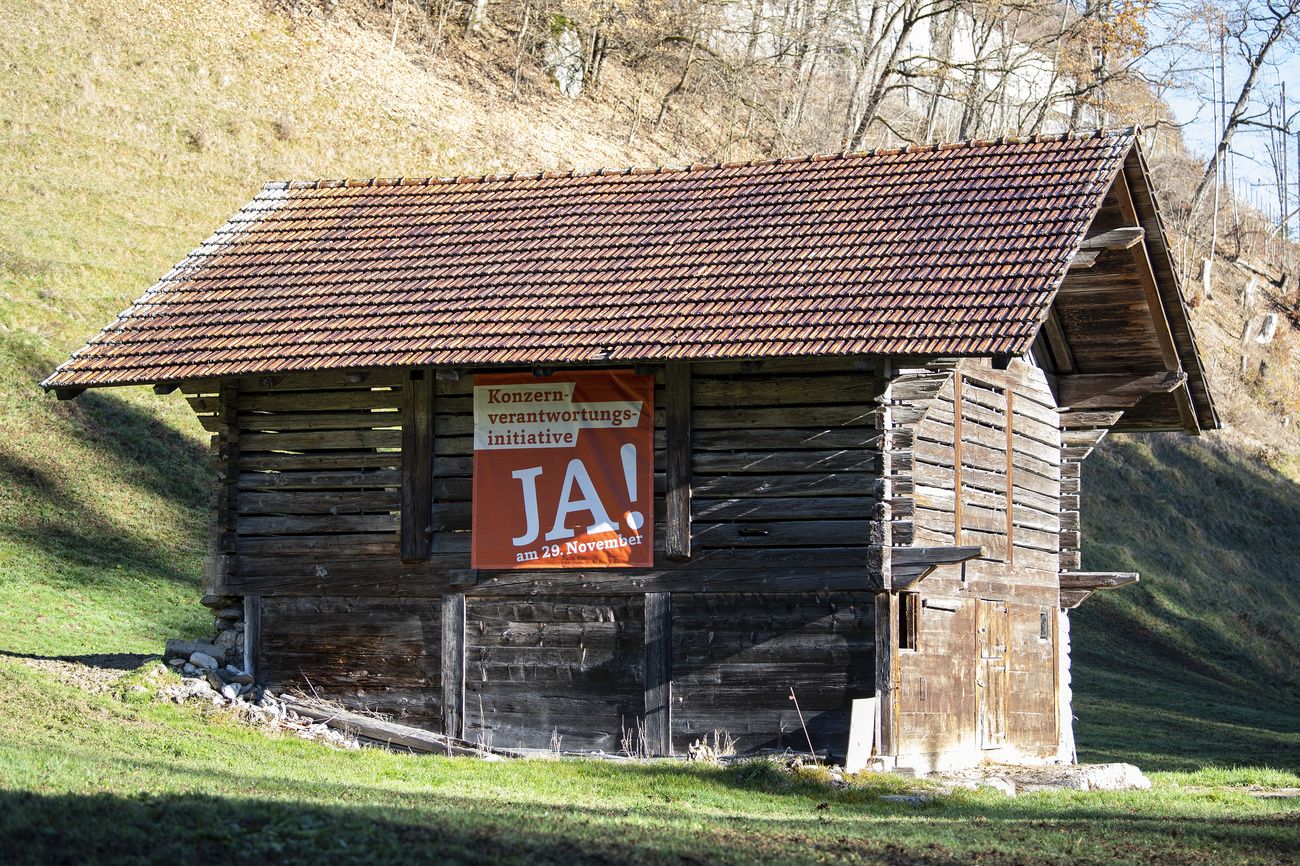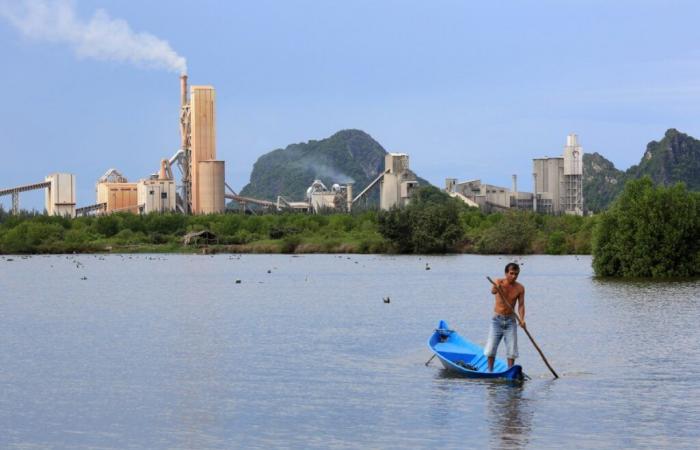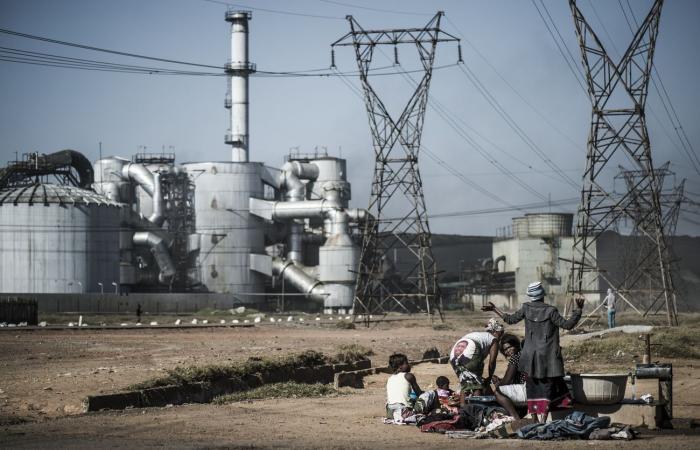A factory of cement company Holcim Vietnam near the Moso Mountains in Hong Chong.
AP Photo/Na Son Nguyen
Companies based in Switzerland and trading around the world must respect human rights and environmental standards. An initiative which will be launched in January reactivates the debate while Switzerland must adapt to European legislation.
This content was published on
January 3, 2025 – 10:00
Last May, the European Parliament approved a law requiring companies of a certain size, but also their suppliers, to prevent any violation of human rights and environmental damage in their supply chains. In addition, these companies must explain how they intend to go about reducing their greenhouse gas emissions. In the event of a violation, an independent supervisory authority can impose sanctions.
This more or less corresponds to the message contained in the initiative for responsible multinationals on which the Swiss population had to vote in November 2020. If 50.7% of the electorate had accepted this text, a majority of the cantons had accepted it. refused even though a double yes was necessary. Only a few thousand votes had tipped the scales.
Arguing that Switzerland had more interest in relying on a “concerted international level” approach than going it alone in this matter, the Federal Council rejected this initiative. But he then made the promise that Switzerland would align itself with European regulations. However, the new EU directive on corporate due diligence responds precisely to this.
Plus
Plus
Divided, Switzerland refuses to hold its multinationals accountable
This content was published on
29 nov. 2020
The popular “responsible businesses” initiative was rejected by a majority of the cantons, even if the people said “yes” at 50.7%.
read more Divided, Switzerland refuses to hold its multinationals accountable
A coalition is organized
“Without effective regulations, Switzerland will soon be the only country in Europe with companies without responsibility,” thunders Dominique de Buman. The former Friborg national councilor is at the head of a coalition bringing together representatives of NGOs and the political world whose objective is to place, as four years ago, multinationals in front of their responsibilities.
According to its members, Swiss law does not go far enough today. Therefore, she asks the least Swiss companies, when purchasing raw materials, to be able to identify and announce any risks linked to child labor or inherent to the extraction of minerals in conflict zones. For the former centrist parliamentarian, the current regulations have no weight without applying sanctions. “Switzerland must follow suit, otherwise it could fall behind internationally,” he warns.
The initiative which will be launched on January 7 would require multinationals to commit. The committee which supports it is aiming for 100,000 initials in one month, while 18 months are granted. This could put the Swiss government under pressure, especially since it must soon decide on the subject.
But the chances of success are greater this time than four years ago, multinationals having shown some shortcomings. Examples abound. Here, a pesticide from a large agro group is poisoning drinking water in Costa Rica. There, a multinational raw materials company clears the tropical forest in Borneo for coal. Or a refinery buys gold from a mine in Ethiopia. Each time with consequences for the health of local populations.
Initiative or call?
Around 150 personalities from the political and business world also signed, as part of this coalition, an “Appeal for multinational responsibility aligned with the international level”. Among the signatories, elected officials from the bourgeois camp hostile to the text in 2020.
“After the decision taken by the EU, the initial situation has fundamentally changed,” noted in a press release the former liberal-radical national councilor (PLR, bourgeois right), Doris Fiala. “The argument of the Federal Council according to which a Swiss law for this would leave us behind economically by preventing us from being competitive is no longer defensible,” according to her.
Even within the umbrella organization of businesses, Economiesuisse, often resistant to the rules coming from Brussels, the call has its supporters. Personified by national advisor Elisabeth Schneider-Schneiter, member of the steering committee of this coalition like Dominique de Buman. The centrist said in a newspaper interview NZZ on Sunday that “we should implement EU directives smoothly. Businesses will be able to live with it.”
Generally speaking, this law which deals with supply chains already concerns Switzerland. And in first place, Swiss companies which generate more than 450 million euros per year in the European Union. On the other hand, a significant number of small and medium-sized enterprises (SMEs) established in Switzerland and distributing their products to companies established in the EU have a role in these chains. Conducted by the Swiss State Secretariat for the Economy (SECO), a 2023 study predicts that up to 50,000 SMEs could be subject to a cascade effect.

The 2020 multinational responsibility initiative led to great mobilization throughout Switzerland.
KEYSTONE/Peter Schneider
Brussels regulates, Bern follows
Unlike large groups who view the relaunch of this initiative with skepticism, many SMEs are asking for more stability and more unified rules. Some 600 Swiss companies have already joined the Sustainable Business Alliance created in 2023.
This requires a specific legal status for SMEs which are certified “sustainable”, respecting standards on working conditions, waste and CO2 emissions. With this status, they would no longer need to seek certificates of good repute in the private sector, for example.
For Jonathan Normand, of the B Lab foundation and spokesperson for this Alliance, “many SMEs are currently struggling to know what they must do to be able to continue exporting to Europe”, Switzerland’s main partner. “They need clarity to remain competitive”.
This demand was brought to the federal parliament last September by 84 business leaders who sent a letter to the parliamentarians of the National Council, urging them to support them in adapting to the requirements of sustainability. Patrick Semadeni, boss of the Semadeni Industry Group active in plastics, was one of these signatories. “Sustainability is not an option for SMEs, but a necessity for a long time. This perspective must be urgently taken into account in the political debate,” he declares.
As a follow-up to this letter, a postulate from PLR State Councilor Josef Dittli was adopted. The latter asks the Federal Council to study the effects of European directives on SMEs in terms of sustainable development. A report and actions are announced in 2025.
Text proofread and verified by Balz Rigendinger, translated from German by Alain Meyer/dbu
Plus

Plus
Our newsletter on Swiss foreign policy
Switzerland in a changing world. Observe with us Swiss foreign policy and its developments. We provide you with the perfect in-depth information for this.
read more Our newsletter on Swiss foreign policy









